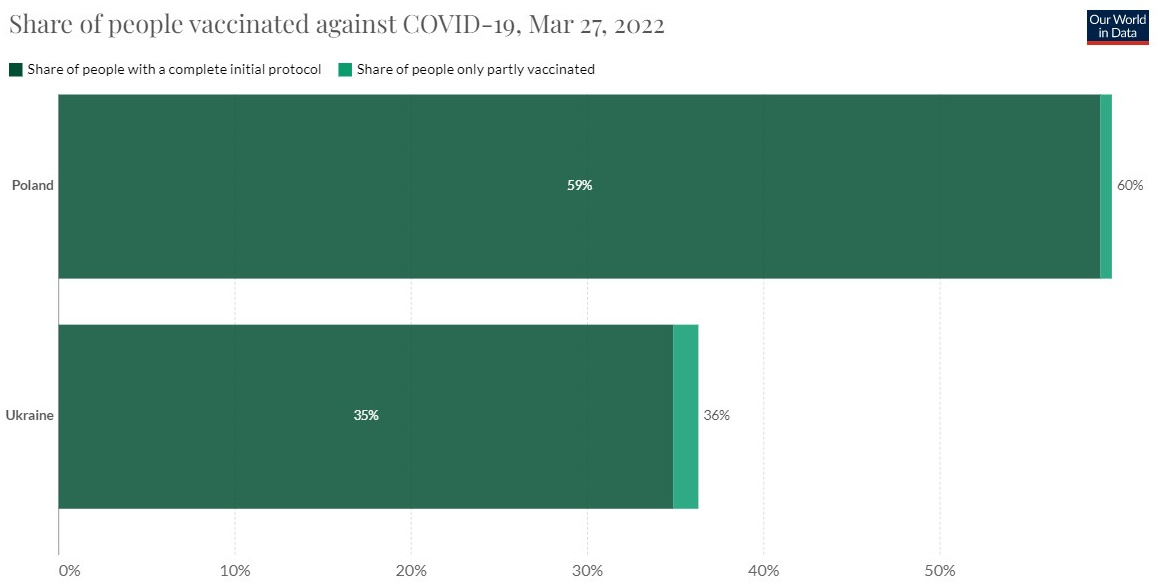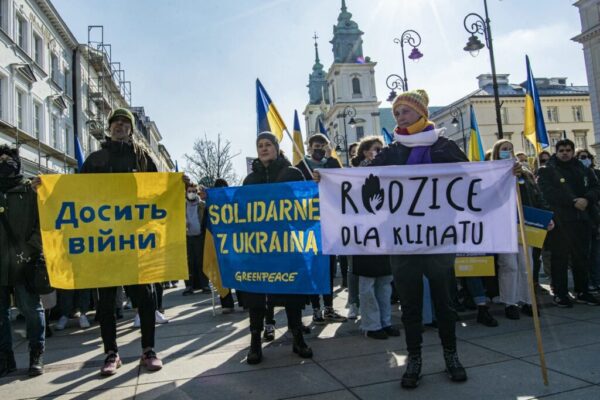A major vaccination campaign is under way in Polish cities in an effort to protect people arriving from Ukraine. However, authorities report limited interest in availing of immunisation and are concerned at the low levels of vaccine coverage against COVID-19, measles and other viruses.
- COVID-19 vaccines and routine immunisations are free for Ukrainian refugees
- In Poland, 12 childhood vaccines are compulsory
- Visitors to Poland staying more than three months must have these vaccines
- Immunisation is required for all children accessing schools in Poland
- 22% of Ukrainian parents in Poland do not intend to vaccinate their children
Poland has welcomed more than three million people since Ukraine came under attack in late February. Providing shelter, food, and clothing, as well as access to health, social and education services has been a major challenge.
The response from Poland has attracted global attention, with authorities and volunteers delivering millions of meals, providing health checks and integrating children into schools.
Under the EU Temporary Protection Directive, people from Ukraine are entitled to access to healthcare, including vaccinations. For host countries, ensuring strong uptake among new arrivals is of mutual interest.
From information to action
From the beginning of the crisis, Adam Niedzielski, Poland’s Minister for Health, has actively encouraged Ukrainian citizens to avail of COVID-19 vaccines and vaccinations recommended for children in Poland. Both countries have struggled with COVID-19 vaccine uptake with 59% of people in Poland and 35% of people in Ukraine having two doses.

Authorities have published educational materials in Ukrainian on Szczepienia Info, a reputable website run by the National Institute of Public Health which is part of the WHO Vaccine Safety Net group (of which Vaccines Today is also a member). Training, guidance and webinars have been offered to doctors, including on how to deal with families who do not have documentation or immunisation records.
UNICEF, the Polish Ministry of Health and the National Institute of Public Health are planning a multi-channel communication campaign targeting Ukrainian mothers in Poland. Information will be shared on Instagram, Facebook, Telegram, Viber and other online platforms, while offline engagement will continue to be offered where refugees access services.
In addition, leafters, posters and billboards have been developed, and SMS messages have been sent to Ukrainian people advising them to make a vaccination appointment for their COVID-19 vaccine.
Vaccine hesitancy remains
Despite these efforts, authorities have encountered low levels of vaccine acceptance. Supplies of COVID-19 vaccines and the 12 vaccines that are compulsory for children in Poland, along with vaccines against meningococcal disease and chickenpox, are not an issue, according to Polish health authorities.
New research by UNICEF indicates that more than 50% of Ukrainian parents are willing to vaccinate their children with all vaccines that are compulsory in Poland. The snap survey shows that a further 12% would take some (but not all vaccinations, and 22% say they will not vaccinate their children in Poland at all. Those planning to stay in Poland and those intending to send children to kindergarten are the most willing to vaccinate.

For those saying they will not be vaccinating their children, the main reason given was intention to leave Poland in the near future (52%). Other common responses included a lack of information on the vaccination process, recent illness for eligible children and medical contraindications.
Just 4% expressed an outright refusal to vaccinate with the same proportion citing lack of trust in the healthcare system and a lack of a vaccination card. For Ukrainian parents, social networks are the main source of information on vaccination in Poland, followed by Ukrainian websites and personal acquaintances.
The communication campaign, which includes the channels most commonly used by parents from Ukraine, is scheduled to end in June. As parents begin to think about the next school year which, for some Ukrainian children, will be in Poland and elsewhere in the EU, the issue of immunisation may come into sharper focus.
Poland’s experience in addressing local hesitancy around COVID-19 vaccination have helped to prepare it for a new communication challenge: convincing a population with a long history of hesitancy who are newly traumatised and facing an uncertain future, to protect themselves and their families against vaccine-preventable infections.
It may look like an uphill struggle, but Ukrainians and Poles could do without a measles epidemic or a resurgence of polio. If Polish health authorities succeed, it may prove to be a turning point in how host countries engage with refugees on a key public health challenge.
The WHO has published guidance for countries hosting refugees from Ukraine on containing vaccine-preventable diseases. The ECDC has advice for neighbouring countries welcoming refugees, and the European Commission has a broad range of resources for people fleeing Ukraine (available in Ukrainian and Russian.)
Read more:
Poland’s vaccine scepticism – a European problem – VaccinesToday
Vaccination & Migration: Lebanon’s battle to remain polio-free – VaccinesToday




